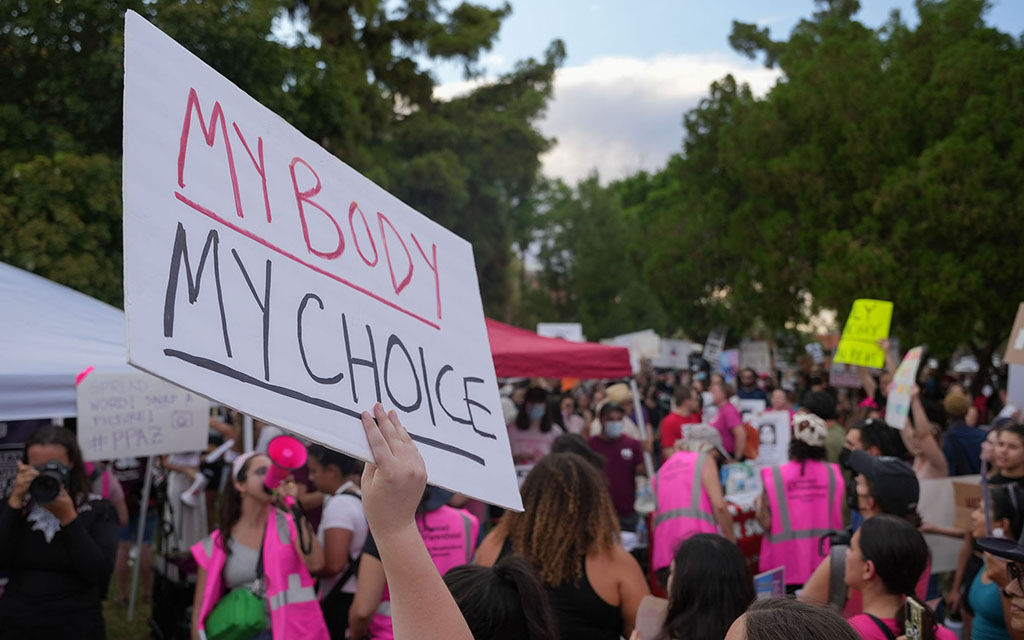WASHINGTON – The Supreme Court ruling that up-ended abortion services in the U.S. a year ago left one form of abortion largely untouched – medication abortions, which account for nearly half of all procedures in Arizona.
The Arizona Department of Health Services says that in 2021, the latest year for which data is available, 48.3% of abortions performed in the state were nonsurgical. The numbers have been growing steadily since 2011, peaking in 2020 at just over 50%.
While abortion opponents have targeted the abortion pill – without success so far – providers say the process is safe and non-invasive and is increasingly being requested by patients.
“It has become the preferred method for termination of pregnancy,” said Dr. Gabrielle Goodrick, founder of Camelback Family Planning in Phoenix. “Having the medication abortion gives women that power to take control of their bodies, if they want, and it’s less invasive but just as safe.”
That popularity comes despite the fact that access to medication abortions in Arizona is relatively restricted when compared with other states.
Arizona is one of just three states that prohibit the mailing of abortion pills, according to the Guttmacher Institute, a reproductive rights research organization. State law also requires that anyone seeking an abortion have at least two in-person consultations with a physician, ruling out nurses and options like telehealth.
Goodrick said that has not kept women from finding ways around those restrictions.
“Self-managed abortion has exploded and it’s being done by patients in all states” who are ordering across state or national lines, she said. “Patients are going to get abortions if they need it. The legality and the laws do not affect the incidence of need for abortion care.”
Her sentiments were shared by Morgan Finkelstein of Protect Our Care, who described the restriction of abortion medication as a dangerous practice.
“Any restriction on accessing abortion medication is undermining patients’ access to safe and legal abortions because we know that abortions are still going to happen,” Finkelstein said.
Requests for comment from anti-abortion organizations in Arizona this week were not returned.
A medication abortion is typically a two-pill regimen, with patients first taking mifepristone followed by misoprostol 24 hours later. Misoprostol can be used alone, but the health department said that 99.2% of medication abortions performed in Arizona in 2021 used the two-pill combination.
Abortion opponents recently targeted mifepristone in a lawsuit that challenged the Food and Drug Administration’s approval of the drug in 2000. One of the plaintiffs in that suit, the American Association of Pro-Life Obstetricians and Gynecologists, claimed the FDA approval process was rushed and unsafe.
The association also raised concerns in a 2021 report about the FDA’s “relaxed” mifepristone prescription requirements during the COVID-19 pandemic, describing the agency’s approach as hands-off and hazardous to women’s health.
U.S. District Judge Matthew Kacsmaryk agreed in April, ordering the FDA to halt its approval of the drug. That ruling was subsequently put on hold by the U.S. Supreme Court while an appeal is heard.
On the same day that Kacsmaryk ruled, U.S. District Judge Thomas O. Rice ruled in a separate case in Washington state that the FDA should maintain “the status quo and rights as it relates to the availability of Mifepristone.” Rice’s ruling applied to the 18 states that sued to preserve access to mifepristone, including Arizona.
Those rulings came less than a year after the Supreme Court overturned its longstanding Roe v. Wade decision, which recognized a right to an abortion in the U.S. In Dobbs v. Jackson Women’s Health, the court ruled on June 24 that abortion restrictions should be left to the states, upholding a Mississippi law that lowered the threshold for an abortion from 24 weeks to 15 weeks.
Arizona has since changed its law to lower the limit for surgical abortions to 15 weeks.
Mifepristone typically can be used within the first 10 weeks of gestation, but FDA regulations allow its use at other stages of pregnancy and in other medical circumstances. Mifepristone, a progesterone blocker, is also used to treat progesterone-sensitive cancers and to induce stillbirth deliveries, Goodrick explained.
She worries that if it is banned, providers will be limited to using the less-effective misoprostol-only regime.
“The idea of actually banning a medicine is just pretty much unheard of, especially when it’s being used by millions of women,” she said.
Access to mifepristone in Arizona is currently protected under Rice’s ruling and Goodrick thinks it unlikely that it will be banned by the Supreme Court, which she said would set “a really bad precedent” and cause them to question the FDA’s process.
“I just feel that I have to trust democracy, that that’s just not going to happen,” she said.




